by Mary Harwell Sayler —
Having the First Word
Into first being God uttered water,
broke open the night,
spilled light and water everywhere.
The earth took God’s Word
to heart,
pumping great cardiovascular
veins of rivers, oceans,
light.
Air performed lively aerations,
breathing into plants,
boosting inhalation, waiting
to lift us, buoyed, out of the water –
wailing and gasping for breath.
From Mary’s poetry book Living in the Nature Poem
By Hilary Horn —
I’m fresh into motherhood – barely two years in. Yet, we didn’t take things slow and I ended up having two children 15 months apart. A baby flips your world upside down. There is such beauty and joy in motherhood. But any mom you follow on social media, you’ll quickly see how a toddler can turn a room upside down in a split second or get themselves into some sort of mess in a blink of an eye. You’re surprised each day that your daredevils are even alive or didn’t end up in the toilet again coming out with a big grin because someone got to touch poop. We wear our sleep-deprived faces as boldy as possible as we are in a this never ending marathon of sleepless nights. Long days and short years was never more true.
Motherhood. So much depth in that single word.
A friend had asked me how my devotional life was going sometime after Ephraim, my first child was born. “What devotional life?”, I thought. Then I plummeted into a stairway of guilt, realizing not only my physical tiredness, but my spiritual drain too. How was I to sustain spiritually during this season? I’m a pastor for crying out loud! Shouldn’t that be a given? I was so exhausted and busy that my devotional life was forgotten.
So that question took me into a journey of wrestling with what even a devotional life looks like now as a mother. No longer are there days I can wake early and have a nice, undisturbed, quiet few hours enjoying breakfast, reading scripture and having lengths of time in prayer and meditation. Because even if for some uncanny reason I wake up at 5am to do it, it’s that day of course that someone is screaming 5 minutes later and needs me when they should be in bed for another hour or two. It’s not about a scheduling problem or being disciplined for most of us. When you have kids, each day is just full of surprises and no matter how hard you try, your well intentioned schedule will be totally screwed up.
I began asking mentor mom’s questions like, “How in the world did you seek God in this season? How do you take time for yourself? What sustained you? What are ways you experienced God while taking care of everyone? How did you even pastor at your church with kids? What was your role? Tell me all your knowledge!!” Seriously, I was so desperate. I wanted a quick fix. Most of their answers varied, but boiled down to this: this season is limited. Embrace it with all you have and seek God in the little moments. Don’t wish for the future years, but be where you are at now. Seek God in the everyday moments. My fresh mom-self just left more confused and asking what did that even mean? I wanted a 5 step program that brought back my old way of doing a devotional life. Give me the steps. Let me have a checklist!
Later on, God gently reminded me about contemplative prayer. I remembered an old book I read from Brother Lawrence, called Practice of the Presence of God. He was a humble cook who learned to seek God’s presence not just when he is praying, but when doing the dishes!
He says, “The time of business does not differ with me from the time of prayer; and in the noise and clatter of my kitchen, while several persons are at the same time calling for different things, I possess God in as great tranquility as if I were on my knees.” Can I get an amen from a mom who has kids screaming at her while trying to get dinner on the table? He knew what was up! He is an old Desert Father who teaches us about seeing God in the everyday, often mundane and chaotic parts of life. That those moments are just as special, just as powerful as having a few hours to sit at Jesus’ feet.
That concept changed my life. Folding laundry became my space to meditate on scripture. Cooking dinner became my prayer room. Doing the dishes while blasting worship music became my daily worship experience. In between cries and diaper changes, stopping for 5-10 seconds to take a deep breath and ask the Holy Spirit to dwell with me saved my life.
Contemplative prayer doesn’t always mean hours of solitude and silence. It’s where we see deep transformational power in our life in the mundane, gritty, joyfilled and often complex thing that we call motherhood. Where somehow we meet God in such transformative places in our day to day that helps us be grace-filled and fully connected to the Creator and with others. Where our snuggled up babies become our sanctuaries and tantrums in stores become our avenues of practicing grace. Where you look back and wonder how you breastfed and took your entire family through the airport security check at the same time with an insane amount of luggage. Grace. Where you actually notice a beautiful flower on the walk to the park because your toddler decided it’s the most wonderful thing in the world. Rediscovering child-like faith and practices admits our hurried and frantic paced lives by letting these moments not slip away, but embracing them – even if it’s just for a moment. Or you stop for 5 seconds to take a deep breath and ask the Holy Spirit to be with You or for Jesus’ love to be upon you. His presence, it’s with you. It’s not glamorous, but through the simple practices, these type of moments transform us – powerfully.
Sure, your devotional life as a mother will never look like it did when you didn’t have kids. You have to truly come to terms with that reality. You’ll get time back someday, but remember that this is a season – a season you’ll never have again. Your babies won’t always be babies. But embrace all those little moments. Stop to just breathe. Stop to just ask God to be with you or speak a scripture out. Make the mundane a place to experience the divine. Sustain and thrive in motherhood.
by Christine Sine
Imagine what our lives would look like if they really flowed to the rhythm God intends for us. Imagine what a sustainable pace that allows time for work and rest, solitude and community, fasting feasting and fun would look like. These are some of the thoughts that revolve in my mind as I seek to live into a sustainable way of life.
Sustainability is not about cutting back on consumption and work, though that can be an outcome. Sustainability is primarily about living into life as God intends it to be.
This is one of my ruling passions. I first grappled with it when I contracted chronic fatigue syndrome 25 years ago. I was sure that stress, overwork and burnout were the chief causes and in my recovery began to explore a more sustainable rhythm of life. My first book about this – Godspace which gave birth to this blog, explored the rhythms of Jesus life and the balance he seemed to find between work and rest, community and solitude, feasting and fasting. Unfortunately that wasn’t enough. It was too intangible and it was still easy for me in our work oriented society to rationalize away the patterns that I felt God was leading me towards. Not surprisingly more overwork, stress and burnout followed.
There are two key questions that have helped me over the last few years to move towards a more sustainable way of life. Asking myself – what kind of God I believe in and what kind of rhythms does creation model.

Photo by Karl Fredrickson on Unsplash
What Kind of God Do I Believe in?
Can you imagine a God who dances with shouts of joy, laughs, plays, enjoys life and invites us to join the fun? I couldn’t until recently. I grew up with a very serious, workaholic God who chastised me for not keeping busy 24 hours a day 7 days a week. Even though I knew this was not what God intended for me, I felt guilty when I slowed down, took a break or just went out and had some fun.
Unless you become like children you cannot enter the kingdom of God. These words riveted my attention a couple of years ago and I asked myself What are the childlike characteristics that make me fit for the kingdom? This question began a journey of discovery for me in which I started to explore the childlike characteristics that God sees as prerequisites to kingdom living. I posted on Facebook asking friends what qualities they believed are essential and slowly formulated a list. Playfulness, awe and wonder, imagination, creativity, curiosity, love of nature, compassion, gratitude, and unconditional trust all emerged as essential qualities of childlikeness. Yet we live in a world of play deprivation, nature deficit disorder, awe and wonder depletion and compassion fatigue. As a result I think we suffer from God deprivation too.
I am increasingly convinced that rediscovering our inner child is essential for our spiritual health. Awe and wonder, imagination and curiosity connect us to the God who is present in every moment and everything in a way that nothing else can. They enrich our contemplative core and expand our horizons to explore new aspects of our world and of our God.
Believing in a God who loves to get his hands dirty planting gardens, who makes mud pies to put on the eyes of the blind, and who does happy dances and sings with joy over all of humanity and in fact all of creation has revolutionized my faith. This is the theme of my upcoming book The Gift of Wonder, but there are a couple of steps you can take now to follow this path.
- Read some children’s books – maybe get back to the favorites from your childhood, or ask your kids, grandkids or friends kids which ones they enjoy most. Read them together or if you don’t have kids and grandkids volunteer at the local library or with friends to read stories.
- Spend time with kids – we all need kids in our lives. They ask us difficult questions and help us let go of our pretentious and often unrealistic expectations of ourselves and of others.
- Reconnect to your senses – kids view the world through all their senses, but we adults often limit ourselves to sight and sound and even these senses have very confining borders. Rediscovering the joy of smells, the wonder of textures, the delight of sunlight through trees opens us to a God of delight and rejoicing, a God who invites us to relax, to just sit in contentment and wonder or allow ourselves to be distracted by the beauty of a butterfly.
What Can Gardening Teach Us About God’s Rhythm?

Garden day
As I often say I read about the story of God in the Bible but in the garden I experience it. That is definitely true for the rhythms of God too. Working in the garden has given me permission to relax into a different pace of life a
We think of spring as the season of planting, but in God’s world seed is scattered in the autumn as seed heads mature and burst. Then the seed rests. Covered by a wintery coat it waits until the warmth of spring brings it to life.
The garden year has two seasons of rest and two of frantic activity. Winter is a time of preparation, when roots go down deep and pruning is done. Then comes spring, probably the busiest time in the garden. We plant, weed, fertilize, and mulch. We spend as much time as possible getting our garden ready for the coming season of growth, blossom and fruit. Then comes summer, vigorous growth, a riot of colorful flowers and rich fruit develop. Surprisingly this too is a season of rest – this time a rest of enjoyment and satisfaction. We watch the maturing of what we have planted, taking credit for it but really having little to do to bring it into being. I love to go out in the morning to see how the beans and zucchini have grown and how the tomatoes have ripened. I do a little weeding and maybe some watering but this is a time to enjoy the beauty, the fragrance and the delight of a hopefully well planned garden. Autumn is the next busy season when the full harvest overwhelms us with it is abundance. We work furiously to eat, preserve and store all that appears. We recruit friends and share harvest celebrations and then we collapse exhausted and grateful for the resting of winter months.
Recognizing that these patterns woven through all creation are God designed and God intended has been liberating for me. I find that my body too responds to these rhythms and if I ignore it I do fall into the trap of unsustainability again.
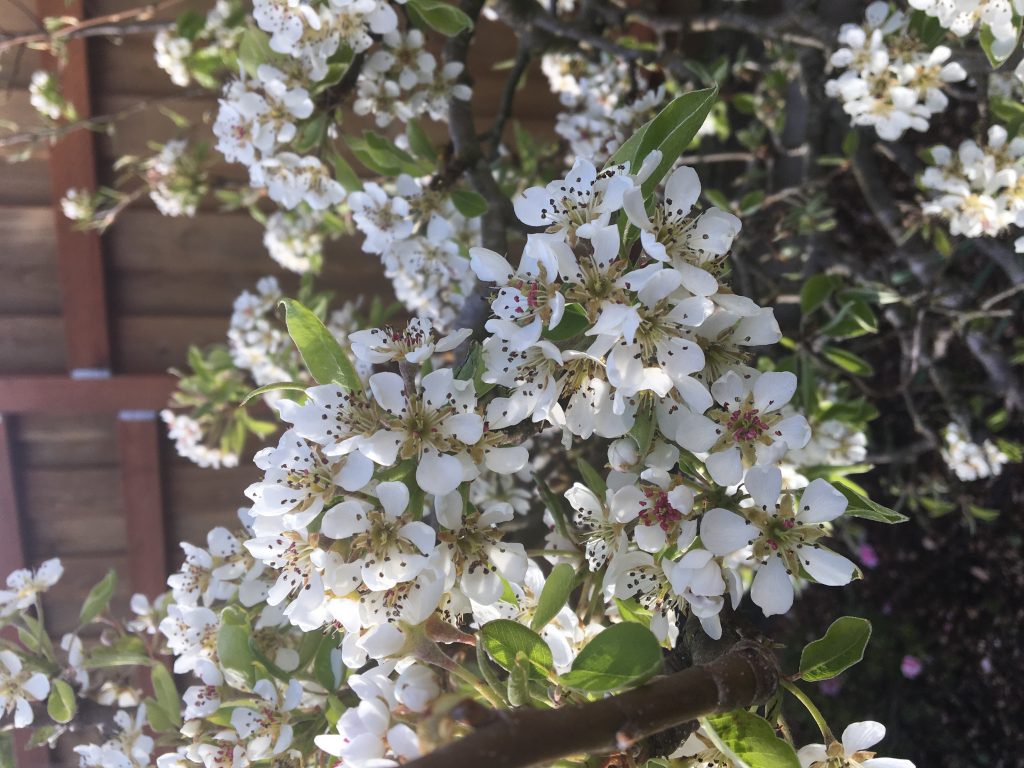
Pear blossom
How Sustainably is Your Rhythm?
I meet so many overworked, burnt out disillusioned Christians who have lost touch with the God of balance and sustainability. Are you one of them? Prayerfully take time today to reflect on your priorities and the rhythm that governs your life. Ask yourself:
Is this the rhythm God intends for me?
How could I develop a more sustainable way of life?
What would my life look like if I gave myself totally to God?
The God of rhythm and balance fill you with the flow of rest and work and enjoyment.
The God of fun and festivity surround you with laughter and play and delight.
The God of life and love enrich you with a future that brings satisfaction and joy and sustainability.
May you dance with the angels,
And shout with the children,
May you sing with all creation
Of the wonder of God’s presence.
By Linden Whitt —
A number of years ago, I was sitting on the bare floor boards of an elder women’s home on an island outside Kuala Lumpur, Malaysia. Nervously hunched over my sketch pad pencil poised, I was drawing her portrait. This woman, who’s worldly possessions didn’t even include a photograph of herself was smiling expectantly for the gift she was about to receive. There’s something so intensely vulnerable about drawing someone’s portrait. To be honest, I got a bit lost feeling that my offering wouldn’t be good enough but I didn’t want to miss the person in front of me and what this portrait meant to her.
It’s World Art Day! As a follower of Jesus and an artist this memory surfaces along with the face of the woman I drew that day. Asking myself once again what it looks like to give of my talent to show value to others in my neighborhood. Transitioning from the often-grandiose experiences of, in my case being a missionary, into my life today with the people I now encounter on a regular basis. We’ve all been gifted with talents, passions, strengths, all pointing towards our greater purpose. How do we then collectively as followers of Christ take action with our giftings, giving of our first, not last-ditch efforts. We often recite these words from the Lord’s prayer, “your kingdom come your will be done.” Do we believe it? That God has already created us with the tools with which to do so, developing them into action is up to us.
For me the first step was getting right with who I am and knowing what my giftings are. There’s no denying we get hit where it hurts the most. Right where God has created us for great impact there seems to be something simultaneously pressing on our deepest wounds. I have friends that have spotted this in me, pointing out my own denial in my creativity. It’s true, I’ve seen the gift in pieces in the past, marked by shame around even being an artist. People in my life that made me feel art or being creative was bad, cast a shadow over a beautiful gift longing to be redeemed. But then that’s the point! Jesus came to redeem all things! He’s redeemed the desire and drive in me to develop the gifts I’ve been given and He wants to do the same for you!
Collaborating within a life-giving community is equally important. The people around us; family, friends, coworkers, are all vital to encouraging our growth and helping us foster new ideas. I cannot understate the importance of being around people who encourage your giftings. Speaking directly to them and seeing who you really are, not inserting their personal opinions on what they think you should do or how you should serve others. Surround yourself with people who encourage you to learn, grow, play, try, and of course fail. It’s a healthy part of the entire learning process working through our mistakes, we learn along the way! For me the right group of people sparked new ways of blending my giftings together causing me to step out, igniting my greater purpose!
Beginning something new can be hard especially when it feels so uncomfortable and clunky trying to figure out where to start! This was certainly how I felt last year when I left my job in search of more creative endeavors. However, each job I was subsequently applying for had been almost identical to where I had just been. I found myself bewildered as to why I was so exhausted by this process but then continued to chase opportunities that weren’t right for me. Nothing changed until my mindset did, stepping outside my comfort zone into things I knew I was interested in and passionate about. I started looking for creative roles marked with a greater purpose and found a mixture of places to land that foster my strength of working with children, love of art, and desire to try new things.
One of my favorite examples of someone blending their strengths with their greater purpose is Mr. Rogers. Fred Rogers, of the children’s T.V program Mr. Rogers Neighborhood spent years blending his degree in music composition, love of puppets, interest in child development, and spirit of kindness to create a safe space for children as he discussed often difficult topics and current events. He once said, “You rarely have time for everything you want in this life, so you need to make choices. And hopefully your choices can come from a deep sense of who you are.” And so, he modeled, preaching in effect on loving one’s neighbor using the gifts he was uniquely fashioned with to do so.
What would it look like for you to create a better future for your neighborhood using your talents? Our neighborhoods are desperate for beauty. Broken, raw people are all around us looking for hope and we know it can only be found in Jesus. Using art as an example, is a gift to communicate, but it’s never more important than people. When you volunteer do you share the best of your gifting’s with your community? Are you really great at graphic design but when you volunteer you lick stamps and address envelopes? Do you enjoy painting and hanging out with teenagers but never thought about asking the local community center if you could paint a mural with the kids on the wall of their otherwise drab parking lot? There are a lot of things we can all do but what are you uniquely designed to do? What would it look like for you to share the absolute best of who you are with your neighborhood? To contribute in a way that’s unique to you, remembering it goes missing without your involvement.
Celebrate Art Today!
Linden Whitt is o riginally from the Pacific Northwest Linden met Jesus at the tender age of 7. Artist, reader, maker of things, lover of culture, food, hospitality, and most of all friends and family! Years as a missionary and working for various ministries gave her opportunity to explore art, worship, writing, and new cultures, all within the context of sharing Jesus with others. She currently lives in Seattle where she oversees inventory for a boutique, teaches craft and sewing classes, and hangs out with the cool kids on Sundays, teaching mini art lessons at church.
riginally from the Pacific Northwest Linden met Jesus at the tender age of 7. Artist, reader, maker of things, lover of culture, food, hospitality, and most of all friends and family! Years as a missionary and working for various ministries gave her opportunity to explore art, worship, writing, and new cultures, all within the context of sharing Jesus with others. She currently lives in Seattle where she oversees inventory for a boutique, teaches craft and sewing classes, and hangs out with the cool kids on Sundays, teaching mini art lessons at church.
by Lilly Lewin
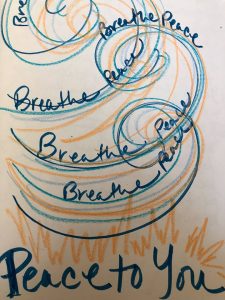
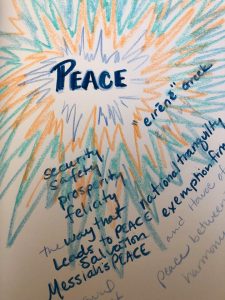
By Dave Luebkeman —
Extreme poverty and the environment are not two separate issues and a healthy environment is vital to a community’s ability to fight poverty. Plant With Purpose is reducing developing world poverty using a three-part holistic approach to transform lives of the rural poor including environmental restoration, economic empowerment, and spiritual renewal.
Plant With Purpose families cut their level of poverty in half and lives are being transformed in seven countries!!
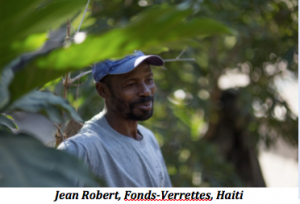 “I used to only plant on the fence line, but now every avocado I eat I plant the seed. When the land uphill from mine was recently sold, I told the new owner: ‘That is fine but you have to plant trees on your land!’
“I used to only plant on the fence line, but now every avocado I eat I plant the seed. When the land uphill from mine was recently sold, I told the new owner: ‘That is fine but you have to plant trees on your land!’
“I also have another plot of land near the forest that in the past was very poor. I applied compost and now the harvest is so great that I was able to buy a mule! I am also able to pay for my children’s school fees and buy medicine for my family as well as other things that we need.”
We work specifically in places, like Jean Robert’s, where poverty is caused by deforestation. In poor rural areas, farmers who are desperate to feed their families often turn to cutting trees as a way to clear land to farm or earn income through the sale of charcoal or fuel wood. Yet attempts to grow crops on cleared land are unproductive because the soil’s fertility and ability to hold water are compromised. Deforestation leads to serious erosion, causing soil depletion, water pollution, and increased vulnerability to storms and other disasters. The continued decline in productivity then leads to more tree cutting, creating a vicious cycle of poverty and deforestation. We work alongside farmers to restore their land and anchor the soil through reforestation and conservation techniques. Nitrogen-fixing trees add nutrients to the soil. Fruit trees provide a source of nutrition and income. And forest trees create longevity and improve biodiversity. The end result is an 80% increase in crop production and improved resilience during disasters—both for today and tomorrow.
The majority of poor people who live in rural communities have little to no access to formal banking systems, making it difficult to save money or take out loans at fair interest rates. Through Sustainable Development Groups (SDGs), groups come together both to save and create credit opportunities. Self-selected, self-managed groups work together to increase their savings and then mobilize their own money through small loans to other group members to develop small businesses, invest in their farms, provide for children’s education, pay for health care costs, or cover costs related to unexpected emergencies. The agreed-upon interest payments return to the group, rather than an outside institution, which increases each individual’s savings. Groups also receive intensive training in financial management and small-business development. Through this methodology, groups are growing their savings as well as gaining a sense of dignity and empowerment through their accomplishments. Plant With Purpose families in SDGs are twice as likely to have built up six months of cash reserves.
Plant With Purpose believes that standing for justice and fighting poverty must be done in a way that offers dignity. Every person is created in God’s image, and all people have God-given gifts they can use to create change in their own communities. So as we stand for justice, what we’re really doing is walking alongside. We equip families and individuals to stand on their own and address their own problems. Through these efforts, basic needs are met, people experience reconciliation, and human rights are addressed. Partner farmer’s crop yields grow and savings increase as a result of their hard work., but more than that, people are empowered to live with God-given hope and dignity.
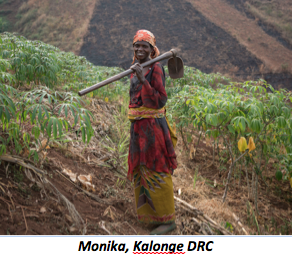 “First it’s about praying and having faith. That’s how you start the process of being changed. God will come. We have to work in order to eat. The pastor told us that God was the first worker. God is the initiator of work. We pray and believe that we can succeed because God did so even before we were here. God is the model for how we live.”
“First it’s about praying and having faith. That’s how you start the process of being changed. God will come. We have to work in order to eat. The pastor told us that God was the first worker. God is the initiator of work. We pray and believe that we can succeed because God did so even before we were here. God is the model for how we live.”
We recognize that poverty is both physical and spiritual, so any holistic approach to community development must address both. Monika knows real transformation starts with a saving faith in Jesus Christ. We also recognize that empowering local leaders ultimately creates more sustainable community development efforts. In response, we work in partnership with local churches to equip pastors and church leaders and to support congregations in their outreach and discipleship efforts. As churches are equipped to live out their calling to love God and love their neighbors, they are leading the way in community change.
Plant With Purpose works in The Dominican Republic, Haiti, Mexico, Tanzania, Burundi, The Democratic Republic of the Congo, Thailand and soon starting a pilot program in Ethiopia.
Plantwithpurpose.org – Follow us on Instagram @PlantWPurpose and we’ll plant a tree!
 Dave Luebkeman – Regional Representative, San Francisco Bay Area
Dave Luebkeman – Regional Representative, San Francisco Bay Area
With 30+ years experience in business and finance, Dave was eager for a change of pace. 2016 marked that change as he joined the Plant With Purpose team as Regional Representative for the San Francisco Bay Area. In his role, Dave meets with partners to educate them on our programs, build awareness across the Bay Area, and deepen financial support for Plant With Purpose’s programs.
Dave served as CFO and Vice President of Brookfield Residential Properties San Francisco Division for 14 years. Prior, he served 14 years in various finance positions with Bank of America, and two years as a CPA in the Bay Area. Dave holds an MBA from Golden Gate University and a BS in Accounting from Cal State Hayward. Dave also brings his experience as a program coach in public speaking and service on a nonprofit board of directors.
Since Easter 2018, Godspace has been starting a theme for posts on Sustainability. Below are some wonderful resources and books that you may be interested in for a further study.
- Silent Spring by Rachel Carson. This was the book that started my journey into environmentalism.
- The Art of Loading Brush by Wendell Berry
- Cradle to Cradle: Remaking the Way We Make Things by Michale Braungart
- L is for Lifestyle by Ruth Valerio
- A Moral Climate: the ethics of global warming by Michael Northcott
- A Christians Guide to Environmental Issues by Martin and Margot Hodson
- Good Green News: Christ’s Path to Sustainable and Joyful Life by T. Wilson Dickinson
- When Enough is Enough: A Christian Framework for Environmental Sustainability by Editor R.J. Berry
- Christianity, Climate Change and Sustainable Living by Nick Spencer and Robert White
- Living with Other Creatures by Richard Bauckham
- Bible and Ecology by Richard Bauckham
- Cherishing the Earth by Martin and Margot Hodson
- Creation in Crisis: Christian Perspectives on Sustainability by Editor Robert White
- Hope in an Age of Despair: The Gospel and the Future of Life on Earth by Jonathan Moo and Robert White
- For the Beauty of the Earth: A Christian Vision for Creation Care by Steven Bouma-Prediger
- The Omnivore’s Dilemma by Michael Pollan
- Let Them Eat Dirt by Dr Brett Findlay and Marie-Clare Arietta
- Braiding Sweetgrass: Indigenous Wisdom, Scientific Knowledge and the Teachings of Plants by
- Food And Faith: A Theology of Eating by Norman Wirzba
- Keeping God’s Earth: The Global Environment in Biblical Perspective by
- Salvation Means Creation Healed: The Ecology of Sin and Grace: Overcoming the Divorce between Earth and Heaven by
As an Amazon Associate, I receive a small amount for purchases made through appropriate links.
Thank you for supporting Godspace in this way.
When referencing or quoting Godspace Light, please be sure to include the Author (Christine Sine unless otherwise noted), the Title of the article or resource, the Source link where appropriate, and ©Godspacelight.com. Thank you!






